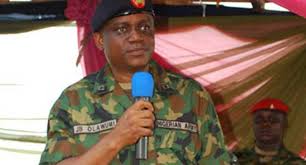A tense confrontation has erupted between Major-General Johnson Olawumi (RTD), former Director General of the National Youth Service Corps (NYSC), and Senator Adams Oshiomhole, following controversial remarks by the latter regarding illegal mining activities in Nigeria.
Senator Oshiomhole, known for his bold and often fiery statements, recently claimed that retired military generals are heavily involved in illegal mining. In an address that caught national attention, the former Governor of Edo State alleged that these high-ranking individuals, including former generals, are operating illegal mining operations under the protection of private armies. Oshiomhole declared, “Those involved in illegal mining are people in high places, including retired generals. These are not unknown people. They are well-known people with private armies who protect their illegal mining sites.”
The sweeping generalization quickly ignited a firestorm, particularly within military circles, with many retired officers accusing Oshiomhole of recklessly maligning their reputations.
General Olawumi Fires Back:
Reacting fiercely to the accusations, Major-General Olawumi described Oshiomhole’s comments as “harsh and offensive,” underscoring the harm they had done to the dignities of military veterans.
“As a retired general who has faithfully served this country, I find Senator Oshiomhole’s words not only reckless but also a direct affront to my person and the legacy of my service. His insensitive generalization has opened us, retired generals, to unwarranted scorn and suspicion,” Olawumi declared in a statement.
The former NYSC DG stressed that Oshiomhole’s sweeping remarks failed to reflect the values upheld by the nation’s military officers. Olawumi called on the senator to either present concrete evidence to support his allegations or retract his statements entirely. He continued, “As someone who served in the nation’s leadership and now holds a distinguished Senate seat, Oshiomhole must have substantial proof if he chooses to make such serious claims. If he has evidence of retired generals involved in illegal mining, the responsible course of action is to approach the Department of State Services (DSS) or another relevant body, not to spread unfounded allegations.”
Olawumi’s Call for Accountability:
Olawumi, who has long held a distinguished career in both military and civil sectors, added that Oshiomhole’s allegations had made it harder for retired generals to pursue their post-service lives without facing public scrutiny.
“Words matter—especially from someone in Oshiomhole’s position. His claims, with no evidence, put us at risk of public ridicule. The Nigerian people often form opinions based on dramatic headlines and sensational statements. Oshiomhole’s irresponsible accusations serve no real purpose other than to tarnish reputations and inflame tensions unnecessarily,” he noted.
The Fallout: A Divisive Statement Sparks National Debate
The remarks have not only strained the relationship between Olawumi and Oshiomhole but have also stirred a wider national conversation about corruption and illegal mining activities in Nigeria. This issue, which has plagued the nation for years, involves clandestine mining operations often overseen by powerful individuals, with significant environmental and social costs.
In response to growing demands for a clarification, Olawumi did not mince words. “It is the duty of Senator Oshiomhole to either present his evidence or back off. His comments were a slap in the face to soldiers, officers, and men who have faithfully served in the Nigerian military,” he said. “Such allegations, if left unchecked, could incite further division and undermine efforts to curtail illegal mining across the country.”
While the public has been largely divided by Oshiomhole’s broad accusations, many have lent support to Olawumi’s call for a retraction and have underscored the importance of ensuring any allegations are made responsibly.
A Call for Strengthened Measures Against Illegal Mining
Olawumi also called for more robust governmental efforts to address the illegal mining crisis, noting that merely airing allegations was insufficient to tackle the problem at its core. He called for the Nigerian government to enhance regulatory oversight and enforcement to curb illegal mining operations and safeguard the nation’s environmental and economic resources.
“We need clear and effective action. If the government is to be serious about putting an end to illegal mining, a task force must be created comprising security forces, environmental specialists, and representatives from affected communities. Only then will we truly begin to address the issue from the root,” Olawumi asserted.
Moreover, Olawumi pointed to the lack of substantial progress under past administrations, questioning the true commitment of previous government efforts to tackle the issue. Despite former President Muhammadu Buhari’s measures against illegal mining, Olawumi warned that enforcement was still far too lax to bring any meaningful change.
“The issue of illegal mining isn’t one that can be wished away with public statements alone. We need tougher penalties and sustained monitoring to ensure mining activities are carried out ethically and under the law,” Olawumi suggested.
Illegal mining in Nigeria has long been a serious concern. With vast mineral resources, many regions in the country have seen the emergence of illegal mining operations often linked to well-placed individuals within political and military circles. The issue not only damages the environment but also undermines the nation’s economy and law enforcement system. Successful interventions require collaboration across political, environmental, and security agencies.

